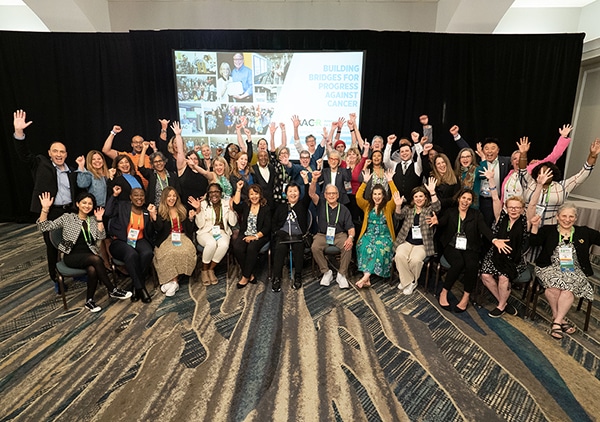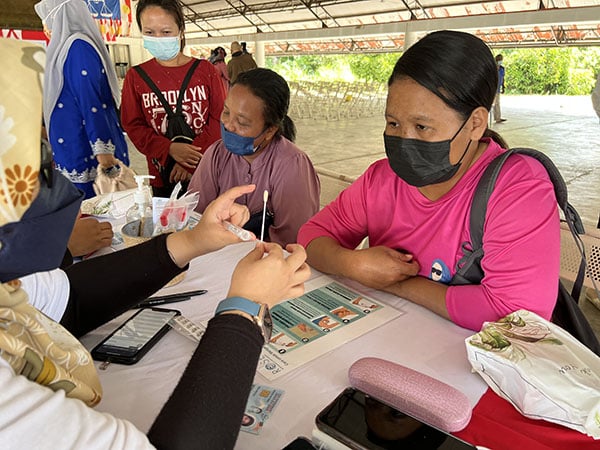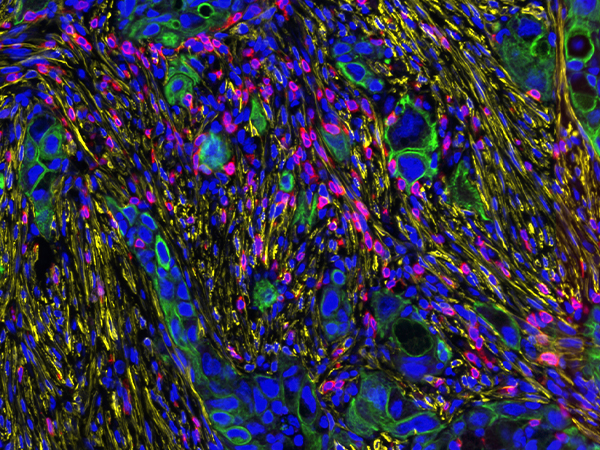Honoring National Cancer Survivors Month, Recognizing the AACR Scientist↔Survivor Program®’s Positive Impact
Editor’s note: As we honor National Cancer Survivor Month, we are also recognizing the AACR Scientist↔Survivor Program’s positive impact on survivors during the past 25 years. This story, written by Thomas Celona, first appeared in Cancer Today, the AACR’s magazine for cancer patients, survivors, and their family and friends.
In cancer research, the lab and the clinic are often siloed, with scientists and patients seemingly occupying different worlds.
Manju George, PhD, is familiar with that disconnect. The Omaha, Nebraska, resident says in her career as a biomedical researcher, she never knew anyone with cancer—up until her own diagnosis with rectal cancer in 2017.
“When you do all the work in the lab and you’ve never met a patient, the perspectives are very different. We cannot forget that all the work that is being done is for benefit of the patient,” said George, one of the cancer survivors who took part in the 2023 Scientist↔Survivor Program.
For a quarter-century, the Scientist↔Survivor Program® has put cancer patients front and center among the thousands of researchers at the American Association for Cancer Research (AACR) Annual Meeting and other AACR meetings. The experience broadens survivors’ cancer knowledge and informs their patient advocacy, while giving scientists an audience with the very people who could benefit from their research.
The Scientist↔Survivor Program®—referred to by participants simply as SSP—occurred as part of the AACR Annual Meeting 2023, which took place April 14 to 19. Survivors active in patient advocacy were selected to participate in the meeting, where they attended special lectures geared toward patient advocates and had group discussions on current topics in cancer care. Additionally, they stood alongside scientists in the exhibit hall to present posters about their advocacy work.

This year’s SSP class had 31 patient advocates hailing from 16 states, one U.S. territory, and three other countries. They were supported by advocate mentors, previous participants who returned as peer guides, and scientific mentors who contributed their research expertise.
SSP traces its inspiration to a September 1998 rally in Washington, D.C., where thousands of advocates, scientists and others impacted by cancer demanded increased federal funding for cancer research. Anna Barker, PhD, chief strategy officer of the Ellison Institute for Transformative Medicine in Los Angeles, recalls seeing survivors lined up to speak with scientists at the event, highlighting for her the need to bring the two groups together. Barker soon developed the idea for the initiative and brought it to AACR CEO Margaret Foti, PhD, MD (hc). The inaugural SSP class met at the 1999 AACR Annual Meeting. This year marked the 25th iteration of the program, with an April 15 reception celebrating the milestone.
“It was clear to Anna that defeating cancer really would require a concerted effort from all sectors of the community,” Foti said during the reception.
Both Barker and Foti noted the patient advocacy movement began in the 1990s, and when SSP started, many researchers felt advocates were getting involved where they didn’t belong. “It’s become more and more obvious that we are mutually dependent, mutually connected, and everybody wins the more connected we are,” said Barker, who has chaired SSP since its inception.
Over the past 25 years, the program has proven to be “something that really nourishes the education of both sides—both scientists and our patient advocates—and really enriches the field in such an amazing way,” Foti said.
“This is not just a meeting; it’s not just a program. It really is a way of thinking about how to work together,” said Jerry Lee, PhD, chief science and innovation officer of the Ellison Institute for Transformative Medicine, who has been an SSP scientific mentor on several occasions.
Lee said he carried his SSP experience with him when he served as deputy director for cancer research and technology for the Cancer Moonshot initiative in 2016. When he set up his desk at the White House, he taped a photo of his SSP colleagues on the wall. “I wanted to make sure that I didn’t lose sight of what we’re all here for—it’s for patient benefit,” he said.
That interaction between patients and researchers was a highlight for many of this year’s SSP participants. “They’re listening to us, and that means the world,” said Allison Rosen, a 10-year colorectal cancer survivor from Houston.
“Every story matters. Every cancer is different. Every experience is different. And the more advocates that can get involved, the more we can help cancer researchers, and we can educate, advocate and collaborate together,” she said.
Fellow SSP participant Julie Chessell, of St. Mary’s in Ontario, Canada, has traveled internationally to speak about her son Brock’s liver cancer, but she said she had never seen advocates highlighted in such a way. “I don’t know anything like this,” she said. “I’ve been to lots of cancer conferences, and they don’t really mix in the advocates.”
Michelle Audoin, a Toronto resident diagnosed with stage IV breast cancer in 2017, said she felt the patient voice was being honored. “We can benefit from [researchers’] experience, and they can understand our firsthand experience, so there’s a feeling of urgency and creating community,” she said.
SSP participants also built camaraderie with their fellow advocates, with several saying they had found a new family. “It’s enriching from the standpoint of meeting other people with like interests,” said Fred Hardy, a prostate cancer survivor from Detroit. “You know that you’re not the only one who has gone through this.”
This year’s class left energized to bring what they had learned at the meeting back home. “We serve as the liaison to the survivors in the community at large,” said Gail Petersen Hock, a cervical cancer survivor from Phoenix. “And if [survivors] want to take an active role, this is the place to come and learn.”
“I love to learn, and I’m here to learn and take back the information to the communities that I work with on a regular basis as an advocate,” said Rosen, who works at the American Cancer Society and also educates her nearly 20,000 TikTok followers about cancer.
“It really is life changing,” she said. “You meet people you would never meet otherwise, and you get involved in initiatives that give you a sense of purpose.”



